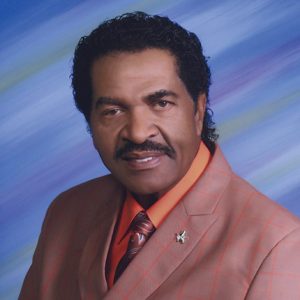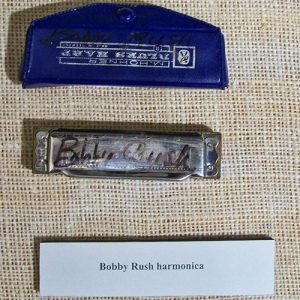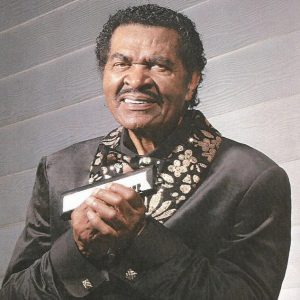calsfoundation@cals.org
Bobby Rush (1933–)
aka: Emmett Ellis Jr.
Bobby Rush, known as the “King of the Chitlin’ Circuit,” is an award-winning blues artist whose music also parlays elements of southern soul, funk, and rap into a genre he calls “folkfunk.”
Bobby Rush was born Emmett Ellis Jr. on November 10, 1933, near Homer, Louisiana, to Emmett and Mattie Ellis; however, the 1940 census lists him as three years old, and other sources have listed his birth year as 1935. The son of a minister, Rush was influenced by his father’s guitar and harmonica playing, and he first experimented with music by tapping on a sugar-cane syrup bucket and playing a broom-and-wire diddley bow. In 1947, his family moved to Pine Bluff (Jefferson County), where his music career began. He headed a band at a local juke joint behind a sawmill, donning a fake mustache so he would look older. It was also in Pine Bluff that he formed key associations with area blues artists such as Elmore James, “Moose” Walker, Boyd Gilmore, and others. It is unclear why he chose the stage name Bobby Rush, though perhaps he changed his name out of respect to his minister father, with whom he shared a name.
After moving to Chicago, Illinois, in the early 1950s, Rush made additional associations with legends such as Howlin’ Wolf, Muddy Waters, Little Walter, Albert King, and others. By the early 1970s, he had his first Billboard R&B hit with the song “Chicken Heads,” which reached No. 34. Rush later made his first full album, Rush Hour, in 1979, with another hit, “I Wanna Do the Do.”
Since the late 1970s, Rush has made dozens of albums and has built both a national and international fan base. Interestingly, his awards and acclaim have come in his later years, as he received his first major recognition after the release of Raw, his twenty-second album, when he received the Soul Blues Male Artist of the Year award at the Blues Music Awards in 2007. His album Hoochie Momma received a Grammy nomination in the blues category in 2001. In 2006, Rush was inducted into the Blues Foundation’s Blues Hall of Fame. His album Porcupine Meat was released in 2016 and won a Grammy the following year.
Rush has been married at least twice. His first wife and three children all died from sickle-cell anemia.
Sexually suggestive, edgy, and humorous, Rush has always had a high-energy performance show that is as entertaining as his music. He touts his desire to keep these shows an integral part of his performances, especially for smaller “Chitlin’ Circuit” clubs, which have limited means to attract big stars. His fans have thusly dubbed him “King of the Chitlin’ Circuit.”
Rush has also become an ambassador for blues, representing the genre in cultural venues worldwide, and has also been noted as a humanitarian. In 2007, he became the first blues artist to perform in China, earning him the title “International Dean of the Blues.” He was later named Friendship Ambassador to the Great Wall of China after performing the largest concert ever held at that site. Rush has also performed for troops in Iraq and supported projects for prisons and at-risk youth.
In 2021, Rush released his autobiography, I Ain’t Studdin’ Ya: My American Blues Story. That same year, he received an honorary doctorate from Rhodes College in Memphis, Tennessee. In 2024, he was nominated for a Grammy for Best Traditional Blues Album for All My Love for You, the seventh time he had been nominated for his music. Rush won the 2024 Grammy, marking the third Grammy of his career.
For additional information:
Barnard, Ninfa O. “Blues Legend Rush, 90, Still Going Strong.” Pine Bluff Commercial, May 13, 2024, pp. 1, 4. Online at https://www.pbcommercial.com/news/2024/may/13/blues-legend-rush-90-still-going-strong/ (accessed May 13, 2024).
Bobby Rush. https://www.bobbyrushbluesman.com/ (accessed May 13, 2024).
Booth, Stanley. “Bobby Rush: A Blues Access Interview.” Blues Access 34 (Summer 1998). http://www.bluesaccess.com/No_34/rush.html (accessed February 5, 2024).
Komara, Edward, ed. Encyclopedia of the Blues. Vol. 2. New York: Routledge, 2006.
Ledbetter, Richard. “PB’s Bobby Rush Recognized for His Impact on Blues.” Pine Bluff Commercial, January 10, 2021, pp. 1, 3. Online at https://www.arkansasonline.com/news/2021/jan/10/pbs-bobby-rush-recognized-for-his-impact-on-blues/ (accessed May 13, 2024).
Mullins, Terry. “Bobby Rush Interview.” Blues Blast Magazine (March 24, 2011). http://www.thebluesblast.com/Archive/BluesBlasts/2011/BluesBlast3_24_11.htm (accessed February 5, 2024).
Rush, Bobby, with Herb Powell. I Ain’t Studdin’ Ya: My American Blues Story. New York: Hatchette Books, 2021.
Schlanger, Talia. “Bobby Rush on World Cafe.” NPR Music. http://www.npr.org/sections/world-cafe/2016/11/22/503027316/bobby-rush-on-world-cafe (accessed February 5, 2024).
Jimmy Cunningham Jr.
Nashville, Tennessee
 Arkansas Black Hall of Fame
Arkansas Black Hall of Fame Divergent Prosperity and the Arc of Reform, 1968–2022
Divergent Prosperity and the Arc of Reform, 1968–2022 Bobby Rush
Bobby Rush  Bobby Rush Harmonica
Bobby Rush Harmonica  Bobby Rush
Bobby Rush  Bobby Rush in Concert
Bobby Rush in Concert 



I’ve loved Bobby Rush since I first heard him in concert in Greenville, Mississippi. I never in my life had been entertained by someone so energetic as he was on that stage! Then Bobby Bland came out and just as he was about to perform some people started up some mess like they were going to fight and Bobby Bland told them on the microphone that these people paid their money to have a great time not to see a fight and if they couldn’t calm down they would be removed instantly. And they hushed that fuss quickly. I was awfully impressed and happy that the crowd of hundreds didn’t get into a panic and start running or anything because we were outside in a big open field. Bobby Rush is the GOAT!